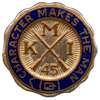 Literary References: |
 Literary References: |
|
Brought to you by The
Samuel Culbertson Mansion (Home of
the Two Little Knights of Kentucky" in historic Old Louisville) and the
people of Pewee Valley, Kentucky
I wanted to
make you aware of a web site about the "Little Colonel' stories,
written by Annie Fellows Johnston at the turn of the 20th century. Many
of the stories take place in Pewee Valley and surrounding places.
The research we have been doing for the site is being shared with the
Oldham County Historical Society, which is planning a Little Colonel
exhibit in LaGrange, KY November 2007-February 2008.
We have
recently posted a page with an explanation about the mention of "the
cadets from Lyndon military school" in one of the stories. Of
course, that can refer to none other than KMI! I recognized it
immediately, because my husband attended day camp there in the summer
when he was a boy.
Donna
Andrews Russell
|
|
"KMI
GHOST Story" Larry R. Humes, KMI Venice had 60 students in its first school back in 1926. By 1932, the population of the entire town had shrunk to 400. The school was empty as the town. When the Kentucky Military Institute, a boys’ prep school located in Lindon (sic), Ky., came to the rescue, with some 150 students that first year, things began to look up. The KMI students would arrive by train, just after the New Year, and return to Lindon, Ky. each April. Several parents and grandparents followed them to Venice. Some purchased winter homes in the city. Growth was not as rapid as it had been in 1926-27, but for the first time in four years, the city’s recovery at last seemed likely. The KMI cadets became an important asset of the town, drawing crowds to the parade grounds every other Sunday when they would march across the vast green field, in their full dress uniforms. The military school remained in Venice for nearly 40 years, and many KMI graduates found their way back to Venice years later. KMI graduate Fred Francis moved to Venice and became the owner of BW Francis (a women’s clothing store) in the 1950s. Others came for vacations or when they reached retirement age. The KMI had saved the town, but the town would be unable to save the school. The school closed its Venice campus in 1970 and, in 1972, ceased to exist entirely. The Lindon campus has been turned into a nursing home and little remains in Venice except a memorial near the old parade grounds and some memorabilia in the Venice Centre Mall. Yet one person said that a student still remains in Venice, possibly still prowling the halls of the old dormitory, or visiting a former classroom, a student who never graduated. The story was recounted by a woman who worked in one of the former school buildings until about 10 years ago. “I always used the stairs on my nightly rounds,” she said. “I was in every corner of the building. I never saw anything out of the ordinary, but one of the cooks did.” According to the tale, the cook had gone into the pantry to get a bag of flour. When she opened the door, she found a young man huddled in the corner, wearing a blue military uniform such as those worn by the KMI cadets. When the cook asked the young man what he was doing there, he turned toward her but said nothing. His horrific countenance was statement enough. Suddenly afraid, the cook left to seek help. When she returned, the frightening young man had vanished. He was never seen again, according to the lady who reported the story. She said she thought the cook might have been nipping the cooking sherry. But then she recounted a second story that may or may not be related to the first. She said that one year, when the students were being taken back to Kentucky on the train, one of the cadets became very ill. He was removed from the train and brought back to Venice to be cared for by his grandmother until he would be well enough to travel. Despite her ministrations, that day never came. The young man died in Venice. Could he be the same man who was cowering in the pantry? Was he looking for his classmates? Was he hoping to find his way back to Kentucky? |
| Kentucky
Military Institute www.kmialumni.org Send e-mail to: kmimail@kmialumni.org Copyright © All rights reserved. |
 |